
CRITICAL REVIEWS IN MICROBIOLOGY
Scope & Guideline
Unveiling Insights, Shaping Microbiology's Future
Introduction
Aims and Scopes
- Microbial Pathogenesis and Host Interactions:
The journal covers the mechanisms through which microorganisms cause disease, including the interactions between pathogens and host immune responses. - Antimicrobial Resistance and Strategies for Mitigation:
A consistent focus on the challenges posed by antibiotic resistance, including genetic mechanisms, environmental impacts, and potential solutions through novel therapies and drug delivery systems. - Microbiome Research and Applications:
Exploration of the human microbiome and its implications for health and disease, emphasizing gut, oral, and respiratory microbiota. - Innovative Therapeutic Approaches:
Research on new treatment modalities, including probiotics, bacteriophages, and biotherapeutics, aimed at combating infections and restoring microbial balance. - Environmental Microbiology and Biotechnology:
Investigation of microbial roles in environmental contexts, including bioremediation, microbial ecology, and the potential of microorganisms for biotechnological applications.
Trending and Emerging
- CRISPR and Genetic Engineering:
Recent papers emphasize the application of CRISPR technology for pathogen detection and genetic manipulation, highlighting its potential in microbiological research and diagnostics. - Microbiome and Disease Associations:
An increasing number of studies are investigating the links between microbiota alterations and various diseases, including metabolic, neurological, and infectious diseases. - Bacteriophage Therapy:
Research on the use of bacteriophages as alternatives to antibiotics is gaining traction, with an emphasis on their therapeutic potential against resistant pathogens. - Biofilm Research:
The exploration of biofilms, particularly in clinical settings, is expanding, focusing on their role in chronic infections and strategies for disruption. - Environmental and Ecological Microbiology:
There is a growing interest in the role of microorganisms in ecological contexts, including their contributions to biogeochemical cycles and environmental health.
Declining or Waning
- Traditional Antibiotic Development:
Research focused solely on conventional antibiotic development is declining, as the field shifts towards exploring alternative therapies and resistance mechanisms. - Basic Taxonomic Studies:
There seems to be a reduction in papers solely dedicated to taxonomic classification of microbes, as the emphasis has moved toward functional and applied microbiology. - Single-Organism Studies:
There is a waning interest in studies that focus exclusively on single microbial species, with a growing preference for research exploring polymicrobial interactions and community dynamics.
Similar Journals
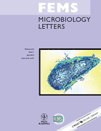
FEMS MICROBIOLOGY LETTERS
Exploring Microbial Innovations and InsightsFEMS Microbiology Letters, published by Oxford University Press, is a prestigious international journal dedicated to advancing the understanding of microbiology through concise and impactful research articles. With an ISSN of 0378-1097 and E-ISSN 1574-6968, this journal encompasses a wide range of topics within the fields of genetics, microbiology, and molecular biology, achieving a notable Q3 quartile ranking in these categories as of 2023. As an essential platform for researchers, professionals, and students, FEMS Microbiology Letters invites submissions that contribute valuable insights into microbial behaviors, genetic mechanisms, and innovative methodologies pivotal in the study of microbiology. Although it is not an open-access publication, the journal's rigorous editorial standards ensure high-quality content that is relevant and significant to its audience, furthering scholarly dialogue and collaboration in the vibrant field of microbiological research.
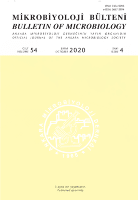
MIKROBIYOLOJI BULTENI
Exploring Innovations in Infectious Disease ResearchMIKROBIYOLOJI BULTENI, with ISSN 0374-9096, is a prestigious academic journal published by the ANKARA MICROBIOLOGY SOC, located in Ankara, Turkey. Established in 1973, this journal has been a vital conduit for disseminating research in the fields of Immunology, Microbiology, and Infectious Diseases, garnering a reputation as a significant contributor to the scientific community. The journal is currently ranked in the Q3 category within Immunology and Microbiology (miscellaneous), and Infectious Diseases, indicating its impactful presence amidst contemporary research. With access options that may be restricted, MIKROBIYOLOJI BULTENI actively welcomes submissions that advance the understanding of critical microbiological principles and practices, thereby supporting both national and international research efforts. Researchers, professionals, and students are encouraged to explore the latest findings shared in this journal, as it continually shapes the landscape of microbiology and infectious disease studies through its comprehensive and rigorous peer-reviewed publications.
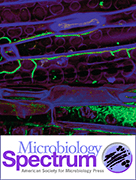
Microbiology Spectrum
Exploring the vast landscape of microbial science.Microbiology Spectrum is a prominent peer-reviewed journal published by the American Society for Microbiology, dedicated to advancing the field of microbiology through the dissemination of high-quality research. Since its inception in 2013 and continuing until 2024, the journal has established a strong presence in key domains such as microbiology, immunology, cell biology, and ecology, achieving impressive quartile rankings including Q1 in Infectious Diseases and Q1 in Immunology and Microbiology as of 2023. With an emphasis on open access to its scholarly content, Microbiology Spectrum aims to foster collaboration and knowledge sharing among researchers, professionals, and students alike. The journal's scope encompasses a diverse range of topics pertinent to the field, making it an essential resource for anyone involved in microbiological research and its applications. Researchers looking to publish their findings in a respected journal will find Microbiology Spectrum's robust impact factor and Scopus rankings serve as testament to its significance and influence within the academic community.
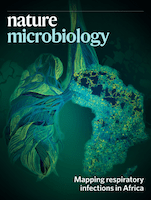
Nature Microbiology
Connecting Microbiology with Real-World ApplicationsNature Microbiology is a premier journal published by NATURE PORTFOLIO that has firmly established itself within the realms of microbiological research since its inception in 2016. Based in the United Kingdom, this prestigious journal specializes in the intricacies of applied microbiology, cell biology, genetics, immunology, and medical microbiology, making it a cornerstone for academics and professionals alike. With an impressive Scopus ranking placing it in the top tier across various relevant categories—such as rank #3 in Genetics and #2 in Applied Microbiology—it underscores the journal’s commitment to high-quality, impactful research. Although it operates under a subscription model, Nature Microbiology's broad Open Access policy facilitates greater dissemination and visibility for its authors. The journal's objectives are centered around publishing cutting-edge advancements that enhance our understanding of microbial life, its interactions, and applications in health and disease. As a Q1 journal across multiple disciplines, it holds immense significance for researchers, professionals, and students enthusiastic about the latest innovations and breakthroughs in microbiology.

Malaysian Journal of Microbiology
Transforming Microbial Research into Real-World ApplicationsMalaysian Journal of Microbiology is a prestigious open-access journal dedicated to advancing the field of microbiology, published by the Malaysian Society for Microbiology. Since its inception in 2005, this journal has become an essential platform for researchers and practitioners, facilitating the dissemination of innovative studies in applied microbiology, biotechnology, and infectious diseases. Based in Penang, Malaysia, this journal not only focuses on local microbiological research but also positions itself within the broader global scientific community. Although currently placed in the Q4 category in several relevant fields—including Applied Microbiology and Biotechnology, Infectious Diseases, and Medical Microbiology according to the 2023 Scopus rankings—it plays a crucial role in encouraging novel research and fostering collaboration among scientists. The journal encourages submissions that contribute to the understanding of microbial processes, disease mechanisms, and novel biotechnological applications, thereby supporting the continuous growth of knowledge in microbiology. With open access since its launch, the Malaysian Journal of Microbiology ensures that all published works are freely available to the public, enhancing their visibility and impact within the scientific community.

mSphere
Pioneering research at the intersection of microbiology and molecular biology.mSphere is a leading open-access journal published by the American Society for Microbiology, dedicated to the dynamic fields of Microbiology and Molecular Biology. Since its inception in 2016, mSphere has rapidly established itself as a reputable source of scholarly research, achieving notable impact factors and excellence within the academic community. The journal ranks in the top quartile (Q1) amongst its peers in Microbiology, and Q2 in the field of Molecular Biology, demonstrating its significance and relevance through Scopus rankings—specifically, it holds the #42 spot out of 182 in the Microbiology category and #108 out of 410 in Molecular Biology. With an editorial commitment to advancing the understanding of microbial and molecular sciences, mSphere provides an accessible platform for researchers, professionals, and students alike to disseminate groundbreaking findings. The journal promotes rigorous peer-review and invites innovative contributions aimed at enhancing microbial research mobility and molecular exploration. Accessible openly since 2016, mSphere continues to thrive as an influential publication driving scientific dialogue and discovery in the microbiological sciences.
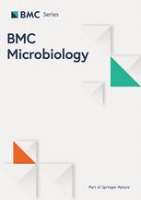
BMC MICROBIOLOGY
Fostering collaboration in the ever-evolving field of microbiology.BMC Microbiology is a leading open access journal published by BMC, dedicated to advancing the field of microbiology since its inception in 2001. With an ISSN of 1471-2180, this journal provides a vital platform for researchers, professionals, and students to share and access high-quality research and innovation in both general and medical microbiology. Based in the United Kingdom, BMC Microbiology holds a commendable Q2 ranking in both various microbiological categories according to the 2023 Scopus rankings, indicating its strong influence in the microbiological community, with a rank of #47 out of 140 in Medical Microbiology and #62 out of 182 in general Microbiology. The journal's commitment to open access ensures that groundbreaking research is freely available to facilitate collaboration and knowledge sharing among the global community of microbiologists. With a focus on publishing original research, reviews, and case studies, BMC Microbiology plays a critical role in disseminating information that can impact health and environmental conditions around the world.
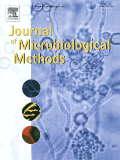
JOURNAL OF MICROBIOLOGICAL METHODS
Advancing methodologies for a healthier tomorrow.JOURNAL OF MICROBIOLOGICAL METHODS, published by Elsevier, is a pivotal platform in the realm of microbiology, covering essential methodologies and innovations from both medical and molecular perspectives. With an ISSN of 0167-7012 and an E-ISSN of 1872-8359, this journal has been a significant contributor to the field since its inception in 1983, with a continued commitment to advancing research through 2024 and beyond. Although classified in the lower quartile (Q3) for both microbiology and molecular biology disciplines, it ranks at #74 in medical microbiology and exhibits a respectable position amidst its peers, marking it as a valuable resource for scholars and practitioners. Researchers, professionals, and students alike will find a wealth of insights and practical methodologies that are vital for contemporary microbiological studies. The journal's emphasis on rigorous peer reviews ensures that the content is both high-quality and relevant, catering to a diverse audience keen on the latest advancements in microbiological practices.

ARCHIVES OF MICROBIOLOGY
Empowering Researchers with Cutting-Edge MicrobiologyThe Archives of Microbiology, published by Springer, is a reputable journal in the field of microbiology, serving as a vital platform for the dissemination of groundbreaking research and critical reviews since its inception in 1974. With an ISSN of 0302-8933 and an E-ISSN of 1432-072X, this journal operates out of Germany and maintains a global reach, promoting high-quality scholarship across multiple disciplines, including biochemistry, genetics, and molecular biology, as evidenced by its Q2 ranking in Medicine (miscellaneous) and consistent Q3 placements in other categories in 2023. Although the journal does not offer open access options, its rigorous peer-review process ensures that published articles are of the highest standard, making it an essential resource for researchers, professionals, and students keen on advancing their understanding of microbial sciences. As the journal converges toward 2024, it remains committed to fostering innovative microbiological research and facilitating interdisciplinary dialogue within the scientific community.
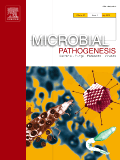
MICROBIAL PATHOGENESIS
Exploring Innovative Solutions in Infectious DiseasesMICROBIAL PATHOGENESIS, published by Academic Press Ltd - Elsevier Science Ltd, is a prominent journal in the fields of Infectious Diseases and Microbiology, with a notable impact factor and classified in the Q2 quartile for both categories as of 2023. Since its inception in 1986, this journal has provided a platform for the dissemination of cutting-edge research that enhances our understanding of microbial infections and their implications in health and disease. The journal is indexed in Scopus, ranking #80 among 344 in Infectious Diseases and #57 among 182 in Microbiology, underscoring its significant contribution to the scientific community. Although it operates under a traditional subscription model, the content is vital for researchers, professionals, and students focused on the dynamics of microbial pathogenesis and the development of innovative therapeutic strategies. The journal's comprehensive scope aims to foster advancements in this critical area of study, bridging the gap between laboratory research and clinical applications.